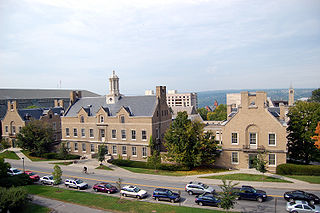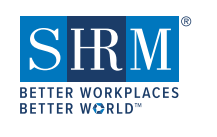Related Research Articles
Human resources is the set of people who make up the workforce of an organization, business sector, industry, or economy. A narrower concept is human capital, the knowledge and skills which the individuals command. Similar terms include manpower, labor, personnel, associates or simply: people.

The New York State School of Industrial and Labor Relations at Cornell University (ILR) is an industrial relations school and one of the four New York State contract colleges at Cornell University, located in Ithaca, New York, United States. The School has six academic departments which include: Economics, Human Resource Management, International and Comparative Labor, Labor Relations, Organizational Behavior, and Social Statistics.
Human resource management is the strategic approach to the effective and efficient management of people in a company or organization such that they help their business gain a competitive advantage. It is designed to maximize employee performance in service of an employer's strategic objectives. Human resource management is primarily concerned with the management of people within organizations, focusing on policies and systems. HR departments are responsible for overseeing employee-benefits design, employee recruitment, training and development, performance appraisal, and reward management, such as managing pay and employee-benefits systems. HR also concerns itself with organizational change and industrial relations, or the balancing of organizational practices with requirements arising from collective bargaining and governmental laws.
The School of Labor and Employment Relations (LER) is a graduate school at the University of Illinois at Urbana–Champaign. Founded in 1946, the school is the second oldest labor and industrial relations school in the nation. Students at Illinois can earn a Master of Human Resources and Industrial Relations or a PhD in Industrial Relations. The school focuses on the MHRIR program. Until August 2008, LER was known as the Institute of Labor and Industrial Relations. In spring, 2015, the master's program expanded to accommodate an online program targeted to working professionals.

The Society for Human Resource Management (SHRM) is a professional human resources membership association headquartered in Alexandria, Virginia. SHRM promotes the role of HR as a profession and provides education, certification, and networking to its members, while lobbying Congress on issues pertinent to labor management.
A chief human resources officer (CHRO) or chief people officer (CPO) is a corporate officer who oversees all aspects of human resource management and industrial relations policies, practices and operations for an organization. Similar job titles include: chief people officer, chief personnel officer, executive vice president of human resources and senior vice president of human resources. Roles and responsibilities of a typical CHRO can be categorized as follows: workforce strategist, organizational and performance conductor, HR service delivery owner, compliance and governance regulator, and coach and adviser to the senior leadership team and the board of directors. CHROs may also be involved in board member selection and orientation, executive compensation, and succession planning. In addition, functions such as communications, facilities, public relations and related areas may fall within the scope of the CHRO role. Increasingly, CHROs report directly to chief executive officers and are members of the most senior-level committees of a company.
Charles Heckscher is a professor in the Department of Labor Studies and Employment at Rutgers University, and director of the Center for Workplace Transformation at Rutgers.

Bio-1 is a consortium of partners founded in 2007 designed to identify and promote bioscience in the Central New Jersey area. It is the result of a $5 million grant made available by the Workforce Innovation in Regional Economic Development (WIRED) program.
The UP School of Labor and Industrial Relations (SOLAIR) is a constituent unit in the University of the Philippines Diliman, the national university of the Philippines.
Staff management is the management of subordinates in an organization. Often, large organizations have many of these functions performed by a specialist department, such as personnel or human resources, but all line managers are still required to supervise and administer the activities and ensure the well-being of the staff that report to them.
Norma Margherita Riccucci is Board of Governors Distinguished Professor of Public Administration at the School of Public Affairs and Administration at Rutgers University in Newark. She is a scholar in the field of Public Administration. An authority on issues related to affirmative action and public management, Dr. Riccucci is widely known for her work in the area of diversity management in government employment.
The John Sessions Memorial Award is presented annually by the Reference and User Services Association of the American Library Association. It recognizes a library or library system which has made a significant effort to work with the labor community and by doing so has brought recognition to the history and contribution of the labor movement to the development of the United States. John Sessions of the American Federation of Labor and Congress of Industrial Organizations (AFL-CIO) was co-chair of the AFL-CIO/ ALA Joint Committee on Library Service to Labor Groups.
Rutgers Business School – Newark and New Brunswick is the graduate and undergraduate business school located on the Newark and New Brunswick campuses of Rutgers University. It was founded in 1929. It operated under several different names before consolidating into Rutgers Business School.
The Ministry of Labour (UK), or Labor (US), also known as the Department of Labour, or Labor, is a government department responsible for setting labour standards, labour dispute mechanisms, employment, workforce participation, training, and social security. Such a department may have national or regional authority.
Myra K. Wolfgang was a labor leader and women's rights activist in Detroit from the 1930s through the 1970s. She was most active in the labor movement, advocating for the working poor and for women in the workforce.
Dorothy Sue Cobble is an American historian, and a specialist in the historical study of work, social movements, and feminism in the United States and worldwide. She is currently a Distinguished Professor at Rutgers University, holding dual appointments in the Departments of Labor Studies and History since 1986.
Sue Schurman is an American scholar, currently distinguished professor at Rutgers School of Management and Labor Relations and dean from 2011 to 2015.
Carola Frege is a German scholar who specialises in international and comparative employment relations. Her research interests include industrial democracy, employee participation, trade unions, migration, and populism. Since 2008, she has been professor of comparative employment relations at the London School of Economics (LSE). She was previously assistant and associate professor of labor relations at Rutgers School of Management and Labor Relations (SMLR) (2001–2003), and lecturer and reader in industrial relations at the London School of Economics Department. Frege is currently a senior research fellow of the International Inequalities Institute at London School of Economics.

Paula Caligiuri is an American psychologist, academician, talent management specialist, book author, and entrepreneur. She works as a Distinguished Professor of International Business and Strategy at D'Amore-McKim School of Business, Northeastern University. Her published contributions in the field of international human resource management have won academic distinctions, and been endorsed in scholarly literature and in wider professional circles. Among her books, Get a Life, Not a Job, Managing the Global Workforce, and Cultural Agility: Building a Pipeline of Successful Global Professionals, received attention by qualified media.
Mark A. Huselid is a university professor, workforce management specialist, book author, and business consultant. He is the Distinguished Professor of Workforce Analytics at D'Amore-McKim School of Business, Northeastern University. He has authored research papers and books regarded as seminal to establishing a strategic link between human resource management and business performance.
References
- ↑ New Jersey Assembly Bill, 250-A, 1947
- ↑ "Events › 2010 › January › Susan Schurman". Center for American Progress. January 2010. Archived from the original on July 21, 2012. Retrieved May 22, 2018.
- ↑ "2010 to 2011: Dorothy Sue Cobble". RSF. Retrieved May 22, 2018.
- ↑ "Previous Sol Stetin Award for Labor History Winners". Hillman Foundation . Retrieved May 22, 2018.